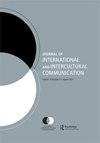工作场所归属的新框架:工具验证和测试与关键文化适应结果的关系
IF 2.2
Q2 COMMUNICATION
Journal of International and Intercultural Communication
Pub Date : 2021-03-23
DOI:10.1080/17513057.2021.1897152
引用次数: 5
摘要
当代全球移民流动挑战了国家群体边界,导致对世界各地接收社会中移民更大包容性的要求。本研究利用日本人和在日外国人的具体案例,旨在验证Komisarof的工作场所归属感框架。该框架完善了对归属感的理解——特别是人们认为自己被另一个群体的文化语言社区成员和共同工作组织核心成员所接受的程度——如何影响移民和东道国社会成员跨文化工作关系的质量和有效性。测量归属两个维度的工具首先通过专家小组对潜在项目的审查进行验证,然后对228名受访者(116名日本人和112名非日本人,代表24个国家)的保留项目进行探索性因素分析。归属的四种排列,即本体解释空间(OIS),与四个结果变量(工作效率、繁荣、组织承诺和跨文化能力)之间的关系进行了假设和测试。OIS对工作效率、繁荣和组织承诺有显著影响,为归属感对跨文化工作环境中这些关键的文化适应结果的影响提供了证据。本文章由计算机程序翻译,如有差异,请以英文原文为准。
A new framework of workplace belonging: Instrument validation and testing relationships to crucial acculturation outcomes
ABSTRACT Contemporary global migrant flows challenge national ingroup boundaries, leading to demands for greater inclusivity of those migrants in receiving societies worldwide. Utilizing the specific case of Japanese and foreigners in Japan, this study aimed to validate Komisarof's framework of workplace belonging. The framework refines understanding of how perceptions of belonging – particularly the degrees to which people see themselves accepted as members of another group’s cultural-linguistic community and as core members of their shared work organization – impact quality and effectiveness of intercultural work relations for both migrants and members of the host society. Instruments measuring both dimensions of belonging were validated first through a review of potential items by a panel of experts, followed by an exploratory factor analysis of retained items with a sample of 228 respondents (116 Japanese and 112 non-Japanese representing 24 nationalities). Relationships between four permutations of belonging, termed ontological interpretive spaces (“OIS”), and four outcome variables (job effectiveness, flourishing, organizational commitment, and intercultural competence) were hypothesized and tested. Significant effects of OIS were found for job effectiveness, flourishing, and organizational commitment, providing evidence of belonging’s effects on these crucial acculturation outcomes in intercultural work contexts.
求助全文
通过发布文献求助,成功后即可免费获取论文全文。
去求助
来源期刊

Journal of International and Intercultural Communication
COMMUNICATION-
CiteScore
3.80
自引率
12.50%
发文量
19
 求助内容:
求助内容: 应助结果提醒方式:
应助结果提醒方式:


